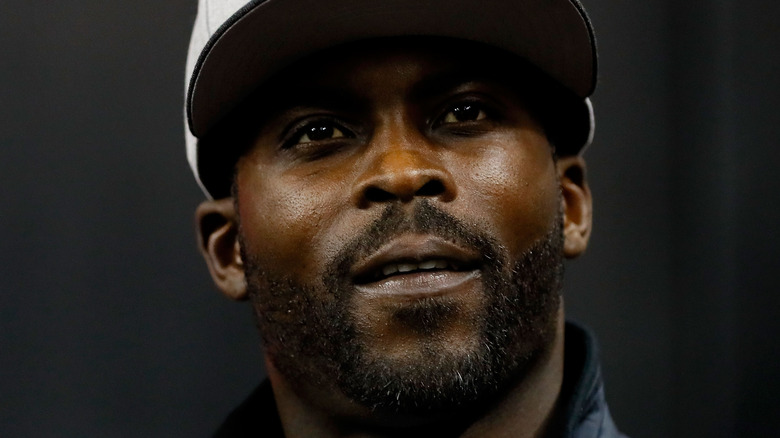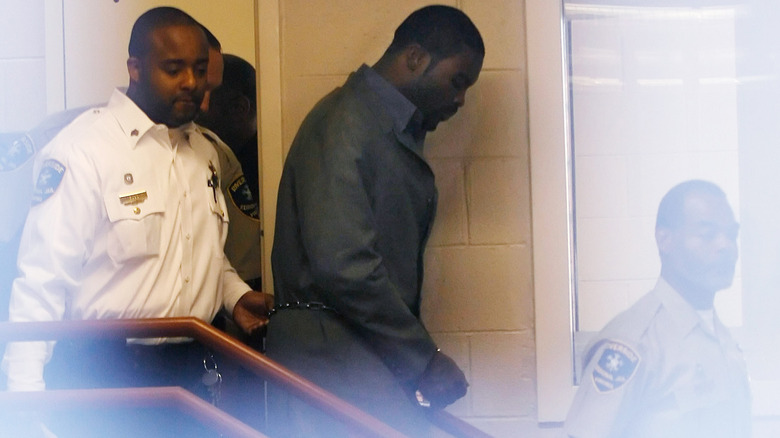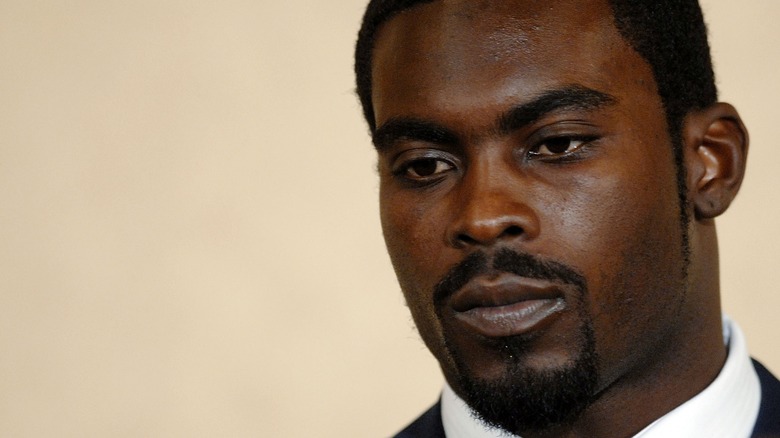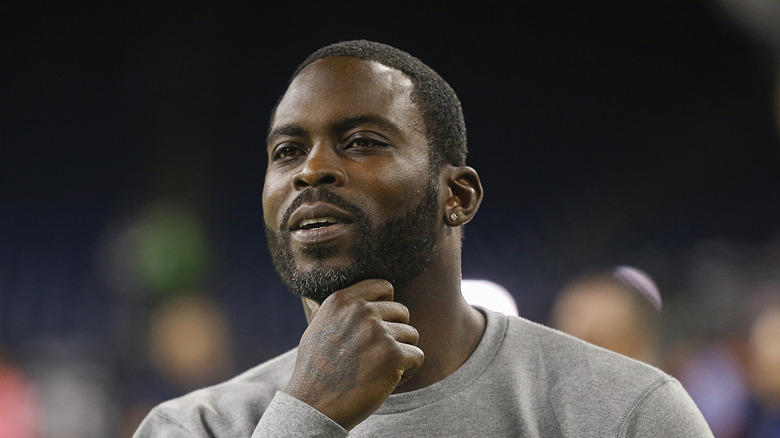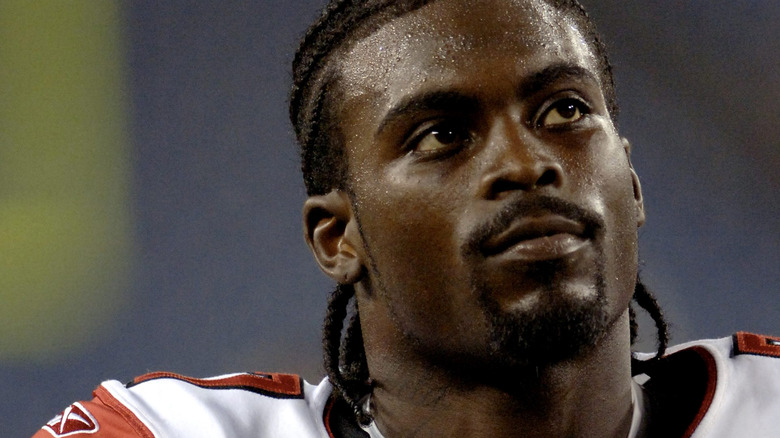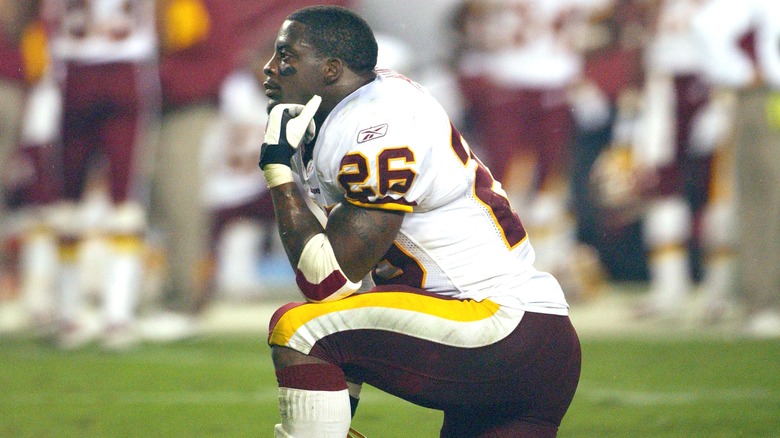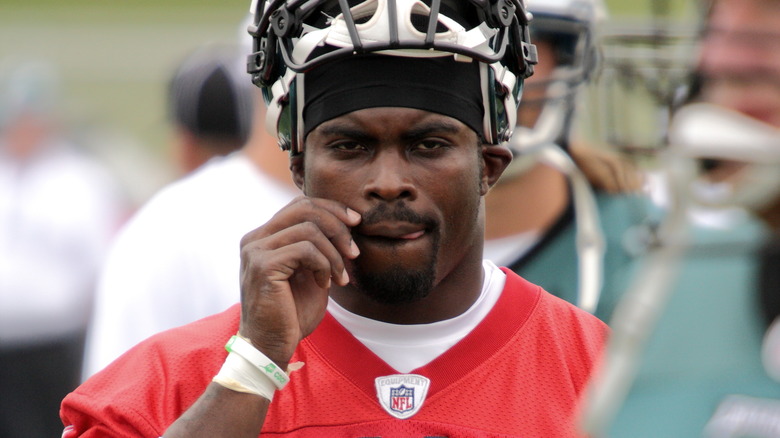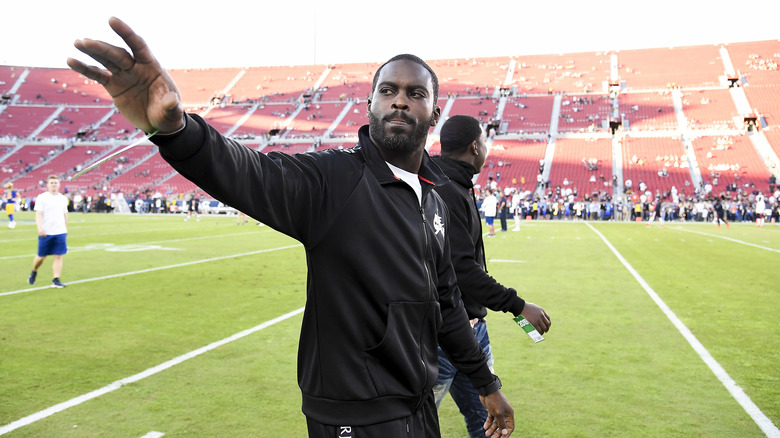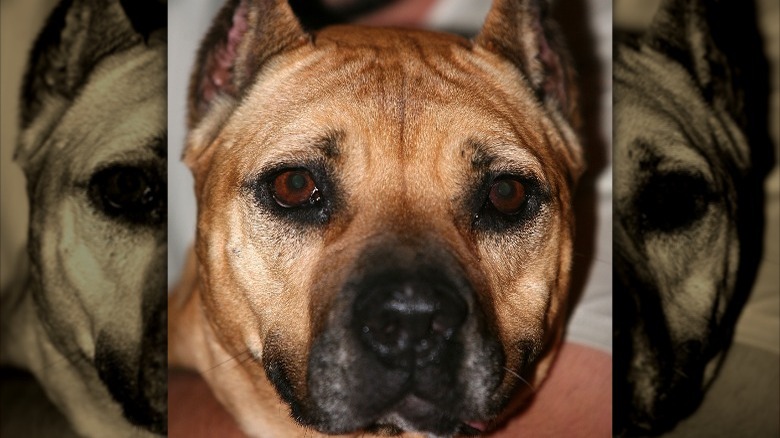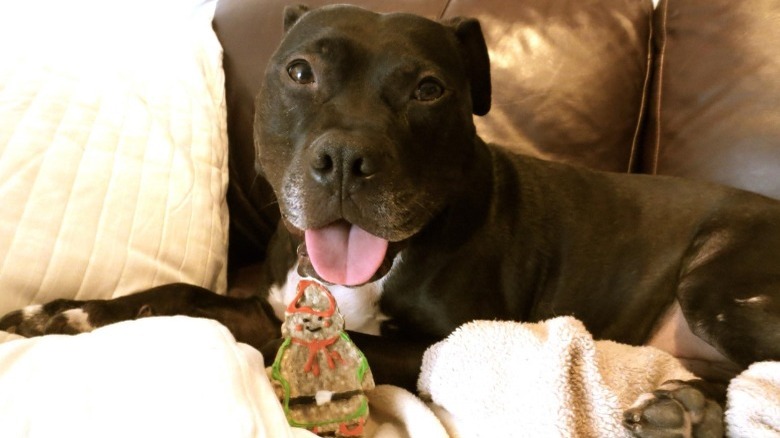Alarming Details From The Michael Vick Investigation
Trigger warning: This article contains descriptions of animal abuse.
In 2014, Matthew Bershadker, the CEO and president of the ASPCA, issued a plea via the New York Post: "We're not obligated to forgive, and it's essential we don't forget."
It came on the heels of the announcement that Michael Vick signed a one-year, $5 million contract with the New York Jets, which is weird, considering that just a few years prior, he was making headlines for his involvement in a massive dogfighting ring. Bershadker pointed out that while yes, he had served his sentence, it didn't erase what he had done — and what was still happening across the country: other cases of dogfighting.
What Michael Vick made headlines for in 2007 should not be forgotten, in large part because dogfighting is still, inexplicably, a thing. And what about Vick? In 2022, Sports Illustrated announced that he had been hired by an athlete management firm, and lauded his return to football and his 2010 "Comeback Player of the Year" award. His new job came a few months after the last two dogs rescued from his fighting ring — Frodo and Johnny Justice — passed away (via The Washington Post). Frodo had a steak, and was surrounded by his loved ones.
What was found on his property?
It started, says the Chicago Tribune, with a drug investigation. Authorities were originally looking into Michael Vick's cousin, Davon Boddie, when they were pointed in the direction of a property in Smithfield, Virginia. Their inquiries expanded into accusations of dogfighting, and an initial inspection of the property owned — but not occupied — by Vick. In a statement given by Surry County Administrator Tyrone Franklin, it was explained that the property "does give the appearance of some activity, illegal activity."
As more information came out (via ESPN), the number of dogs seized was raised to "more than 60," and by the time a federal grand jury handed down an indictment, the equipment recovered from the property left little doubt as to what was going on there. That included treadmills (used to exercise the dogs, usually while wearing weighted collars), pry bars (or break sticks, which are used to force open the jaws of biting dogs), performance-enhancing drugs and syringes, and sections of bloody carpet.
That, Slate explains, was connected to the dogfighting pit that was also found. The floors of the 12-foot square pits with the 2.5-foot-high walls were often carpeted to give the dogs traction. Also found was a stand used to secure females for forced breeding. As Slate says: "Pooches die so often in fights that owners always need new dogs."
The search warrant had expired when federal agents stepped in
The investigation into Michael Vick's Virginia property very nearly didn't happen. According to the Statesboro Herald, the investigation was originally going to be conducted under a search warrant issued to Surry County law enforcement — specifically, one to search the premises for the remains of an estimated 30 dogs. However, the search warrant actually expired before it was executed.
That is why it was federal agents who went into Vick's compound — even though Commonwealth's Attorney Gerald G. Poindexter publicly stated (via The Oklahoman) that they were just planning on issuing another search warrant when they had all of their experts lined up and ready to go. Poindexter insisted that they had simply been thorough, and condemned the involvement of federal law enforcement: "There's a larger thing here, and it has nothing to do with any breach of protocol," he claimed. "There's something awful going on here. I don't know if it's racial. I don't know what it is."
ESPN says that it was a month-old bill called HR 137 that gave federal agents the leverage they needed to investigate themselves, and the raid on Vick's property was just one of a number of similar raids being done on the road to stronger laws against dogfighting. That's a huge difference from what was going on at a local level, with ESPN suggesting "things might be worked out in a friendly settlement with local authorities."
He's one of the heavyweights
About a month after law enforcement raided Michael Vick's compound, ESPN reported on the testimony of an anonymous source who was heavily involved in the dogfighting world. He estimated he had trained somewhere around 2,000 dogs, and claimed that he had often crossed paths with Vick. "He's a pit bull fighter," the source said. "He's one of the ones that they call 'the big boys': that's who bets a large dollar. And they have the money to bet large money. As I'm talking about large money — $30,000 to $40,000 — even higher. He's one of the heavyweights."
By the time of that interview, Vick had formally declared he didn't know anything about any dogfighting that was going on at the property, and the number of dogs taken from the series of buildings was confirmed at 66.
The source went on to say that he'd been present at one of the fights Vick — who was known as "the man that comes with all the money" — entered one of his dogs into. The dog was a pit bull and was allegedly handled by one of Vick's crew, while Vick himself wagered $5,000. Vick's dog lost, the source said, even as he explained: "They shouldn't be really upset, okay? Because it's only just an animal. It's just a dog."
The dogs that lost
ESPN's anonymous informant told them that at the dogfighting match he was at with Michael Vick, Vick's dog lost. So, what happened to the losing dogs? Those horrible details are difficult to read, but they're outlined in the indictment filed against Vick and associates Purnell Peace, Quanis Phillips, and Tony Taylor. Dogs were tested in so-called "rolling" fights to see how well they would perform, and those who didn't show potential were executed in various ways, from being shot to much, much more sadistic methods.
While Vick initially claimed he didn't know anything about what was going on at the property, he later said (via ESPN) "he assisted Phillips and Peace in the killing of the dogs, [but] he did not actually kill the dogs, [and] helped Phillips toss several dogs to the side." Vick would later recant that statement after failing a lie detector test, and ultimately, "Vick admitted taking part in the actual [killing] of the dogs."
Although they initially paid someone to bury the dogs, they later said that after that person refused, they dug the graves and disposed of the dogs themselves.
Pet dogs were used
In 2008, ESPN was reporting on more details that had come to light, thanks to a 17-page document prepared by investigators from the U.S. Department of Agriculture. They had found that Michael Vick and his associates at their so-called Bad Newz Kennels had trained at least some of their dogs to fight by taking dogs that had been living as family pets and using them as bait dogs. The report said: "Vick, Peace, and Phillips thought it was funny to watch the pit bull dogs belonging to Bad Newz Kennels injure or kill other dogs."
This awful footnote to an awful story is just one more reason that Vick's dogfighting case needs to be remembered. The Canine Journal says that February 14 is National Pet Theft Awareness Day, and adds that every year, about 2 million animals are stolen in the U.S. alone. They're often resold as pets, sold to medical testing facilities, or end up being used as bait dogs in places like the Bad Newz Kennels.
In 2018, NBC San Diego reported that 20 dogs — mostly puppies — had been transferred from a rescue shelter in Helena, Arkansas to the Rancho Coastal Humane Society. There, they were being cared for after being used as bait dogs: Authorities warn that most bait dogs aren't adopted — the fees are too high — and are instead stolen or picked up from "free to good home" classified ads.
Yes, people actually defended his actions
During the investigation, there were multiple people who stepped forward to defend Michael Vick and his actions, including Washington Redskins' running back Clinton Portis (pictured). He, says Nova Southeastern University, called dogfighting a "prevalent part of life," and was shocked that Vick was getting all this hassle "for no reason — over a dog fight." He later apologized, saying that he'd only made those comments as a joke. He wasn't the only one, though: When it came time for Vick's sentencing, Hank Aaron and George Foreman submitted pleas for leniency to the court.
"The View's" Whoopi Goldberg also had some shockingly understanding words for Vick, saying (via Reuters): "He's from the south, from the Deep South, this is part of his cultural upbringing. ... this is a kid who comes from a culture where this is not questioned." That was very, very quickly condemned by the president of The Humane Society, Wayne Pacelle. He disputed the idea that dogfighting was somehow connected to a particular race, culture, or area, and noted that not only is dogfighting illegal in every state, but there was a majority belief that it was cruel.
Given the scandal, the headlines, and the horrible things exposed by the investigation, it was more than a little surprising when Vick rebounded to sign with the Philadelphia Eagles. When ESPN interviewed 44 NFL players about it, they were unanimously supportive, with one commenting, "I love that he's turned everything into a positive." A whopping 58.1% thought he had been treated unfairly.
It was just the tip of the iceberg
When ESPN spoke with their anonymous source in the weeks following the raid on Michael Vick's dogfighting compound, the source spoke freely about their code of silence, and relayed how matches were usually set in rural locations and were guarded by lookouts. It turns out that many of them had a lot to lose. John Goodwin, the deputy manager of The Humane Society's Animal Cruelty Campaign, told them that the popularity of dogfighting was on the rise, saying, "It's very interesting that we have got a whole roster of names of professional athletes that we know are involved in dogfighting. Surely, not every single one has come to light."
Two years later, a report from Nova Southeastern University's Shepard Broad College of Law took a look at the prevalence of dogfighting among professional athletes, adding that Vick's entrance into it took place in 2001, 51 days after he signed his deal with the Atlanta Falcons. (That, they note, is when he bought the Virginia property the dogs would later be found on.)
New York Giants running back LeShon Johnson was connected to dogfighting on his property in 2000, leading to the arrest of 30 people and the seizure of 225 dogs. Nate Newton of the Dallas Cowboys was connected to dogfighting back in 1991, Todd McNair (of the Kansas City Chiefs and Houston Oilers) in 1996, and when Qyntel Woods of the Trail Blazers abandoned a scarred, hot tar-covered dog in 2002, he was sentenced to probation and 80 hours of community service.
What happened to Michael Vick?
Although Michael Vick initially said he had no idea what was going on at his property, Nova Southeastern University says that he entered a guilty plea in August of 2007. He was suspended indefinitely by the NFL, saw endorsement deals fall through, and lost an estimated $200 million in salaries, bonuses, and deals.
While waiting for sentencing, he failed a drug test for marijuana — which turned his time out on release into home confinement. The Bad Newz Kennels property was sold (and is now the home of a rescue organization called Dogs Deserve Better), and Vick paid out about $1,000,000 for the care of the dogs that had been removed from his possession. He was sentenced to 23 months in jail, which he served in the minimum security facility in Leavenworth, Kansas.
He was released in May 2009, says ESPN, after serving 19 months. That was to be followed by two months of home confinement in his house in the Hamptons, and then a job working for a construction company. Football came later — when he signed a 2-year deal in 2009, says ESPN — along with three years on probation, and another three-year suspended sentence for state dogfighting charges.
Even animals rights organizations believed the dogs were too damaged
In 2019, The Washington Post did a huge piece on what happened to the dogs seized from Michael Vick's dogfighting pit. They became known as the Vicktory dogs, and there are a ton of adorable pictures of them. They've gone on to be therapy dogs, service dogs, family pets, and couch potatoes, but here's the thing: They almost didn't have the chance.
When it came time to decide what to do with the dogs, both PETA and the Humane Society took the firm stance that they should be euthanized. Humane Society president Wayne Pacelle went as far as calling them (via The New York Times) "some of the most aggressively trained pit bulls in the country," and adding, "The fate of these dogs will be up to the government, but we have recommended to them, and believe, they will be eventually put down."
Fortunately, the dogs (like Georgia, pictured) found advocates in BADRAP, who evaluated all the dogs and knew that there was hope — if they had the help of countless volunteers, foster families, and organizations like the Best Friends Animal Society. (That's where one dog, Mya, was so good with other dogs that she was kept on as a permanent resident/teacher/big sister to puppies and new arrivals.) The rehabilitation of the dogs was seen as a game-changer for those rescued from fighting rings: So many people had been so wrong for so many years — rehabilitation was possible.
It took dogs years to recover
According to The New York Times, the dogs were originally considered to be evidence in the Michael Vick case. They were held for months in kennels as Vick's case went to court, and it ended up giving their advocates time to evaluate them and convince the world that they could be helped.
The Washington Post tracked down what happened to them all in a 2019 piece, and found each had fears and issues that spoke to what they had been through. Frodo had nightmares, and would cry in his sleep. Mel would shake whenever a stranger entered his home. Shadow was terrified of ladders: All the fights in Vick's compound were staged on a ladder-accessible second floor. His nightmares lasted for years, and were so bad that his adoptive mother would sleep in a crate with him. Hazel was missing teeth and part of her tongue — she became a service dog. Makaveli was terrified of loud noises and large fires. Red had trouble going through doorways. Vick once used Teddles in a photo shoot, and he remained terrified of the sound of passing trains.
Mel (pictured) found his home in Las Vegas, with Richard Hunter. He summed up the happily-ever-after of Vick's dogs like this: "Everybody is great in a lot of ways now, but you better believe the ghosts of what Vick did to him [Mel] and did to those other dogs stays with them to this day and always will." Mel passed away after a sudden illness in 2019.
Yes, Michael Vick has dogs again
In 2019, Michael Vick told The Washington Post, "I think people have moved on. I think they've moved past it. ... I don't get any questions about it anymore. People don't talk about it. They don't ask me about it." In 2010, Vick had said (via NBC News) that he really hoped to have a dog again someday: "I think just to have a pet in my household and to show people that I genuinely care, and my love, my passion for animals."
Not everyone was sold on the idea, with DogTime absolutely condemning the idea, and saying that Vick's actions didn't show "a lack of cruelty toward animals," much less the kind of care and compassion that allowed people to be responsible pet owners. Who did think it was fine? Wayne Pacelle of the Humane Society, who said he thought Vick "would do a good job as a pet owner."
In 2012, he confirmed that, yes, he had a dog once again. While the Humane Society didn't comment, the ASPCA certainly did (via ESPN), and reminded everyone that he had never apologized for the dogfighting ring and the abuse suffered by the dozens of dogs in his care over a period of six years. Even Fox Sports came out against it, saying: "He should be able to go on to a normal life, with his daughter studying at the table while he works. But he also should not own a dog. Never again."
